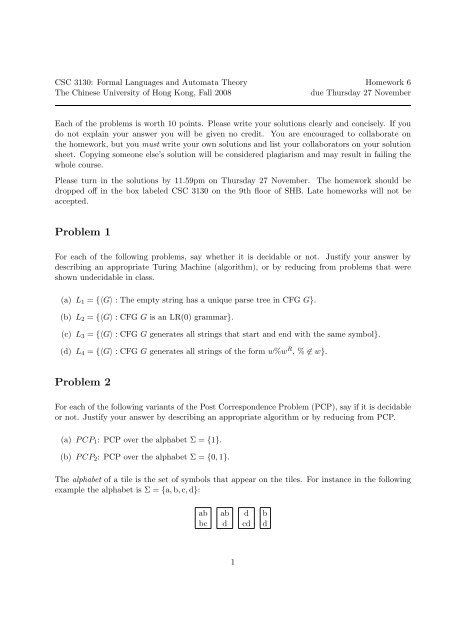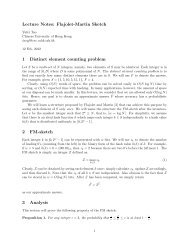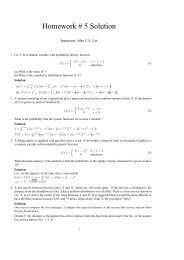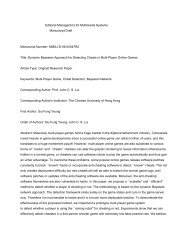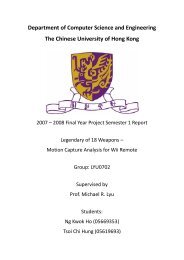Homework 6 - The Chinese University of Hong Kong
Homework 6 - The Chinese University of Hong Kong
Homework 6 - The Chinese University of Hong Kong
You also want an ePaper? Increase the reach of your titles
YUMPU automatically turns print PDFs into web optimized ePapers that Google loves.
CSC 3130: Formal Languages and Automata <strong>The</strong>ory <strong>Homework</strong> 6<br />
<strong>The</strong> <strong>Chinese</strong> <strong>University</strong> <strong>of</strong> <strong>Hong</strong> <strong>Kong</strong>, Fall 2008<br />
due Thursday 27 November<br />
Each <strong>of</strong> the problems is worth 10 points. Please write your solutions clearly and concisely. If you<br />
do not explain your answer you will be given no credit. You are encouraged to collaborate on<br />
the homework, but you must write your own solutions and list your collaborators on your solution<br />
sheet. Copying someone else’s solution will be considered plagiarism and may result in failing the<br />
whole course.<br />
Please turn in the solutions by 11.59pm on Thursday 27 November. <strong>The</strong> homework should be<br />
dropped <strong>of</strong>f in the box labeled CSC 3130 on the 9th floor <strong>of</strong> SHB. Late homeworks will not be<br />
accepted.<br />
Problem 1<br />
For each <strong>of</strong> the following problems, say whether it is decidable or not. Justify your answer by<br />
describing an appropriate Turing Machine (algorithm), or by reducing from problems that were<br />
shown undecidable in class.<br />
(a) L 1 = {〈G〉 : <strong>The</strong> empty string has a unique parse tree in CFG G}.<br />
(b) L 2 = {〈G〉 : CFG G is an LR(0) grammar}.<br />
(c) L 3 = {〈G〉 : CFG G generates all strings that start and end with the same symbol}.<br />
(d) L 4 = {〈G〉 : CFG G generates all strings <strong>of</strong> the form w%w R , % ∉ w}.<br />
Problem 2<br />
For each <strong>of</strong> the following variants <strong>of</strong> the Post Correspondence Problem (PCP), say if it is decidable<br />
or not. Justify your answer by describing an appropriate algorithm or by reducing from PCP.<br />
(a) P CP 1 : PCP over the alphabet Σ = {1}.<br />
(b) P CP 2 : PCP over the alphabet Σ = {0, 1}.<br />
<strong>The</strong> alphabet <strong>of</strong> a tile is the set <strong>of</strong> symbols that appear on the tiles. For instance in the following<br />
example the alphabet is Σ = {a, b, c, d}:<br />
ab<br />
bc<br />
ab<br />
d<br />
d<br />
cd<br />
b<br />
d<br />
1
2<br />
Problem 3<br />
A triangle in a graph is a clique <strong>of</strong> size three (that is, a set <strong>of</strong> three vertices {u, v, w} so that (u, v),<br />
(v, w), and (u, w) are all edges in the graph). A triangle cover is a subset <strong>of</strong> vertices that touches<br />
all the triangles in the graph. Let<br />
(a) Show that T C is in NP.<br />
T C = {(G, k) : G is a graph with a triangle cover <strong>of</strong> size k}.<br />
(b) Show that T C is NP-complete by giving a polynomial-time reduction from vertex-cover (V C).<br />
Problem 4<br />
Now it is time to reflect on the last few months and provide some feedback on your experience as<br />
a student in CSC 3130. You may use the following questions as guidelines, but feel free to write<br />
your own observations if you prefer.<br />
• What was your favorite topic? What was your least favorite one?<br />
• Are there any topics that picked your interest and wished we had spent more time on? Any<br />
ones you found uninteresting, or wished we had skipped altogether? Anything you might<br />
want to learn more about in the future?<br />
• Did you feel sufficiently prepared for the class? If not, what kind <strong>of</strong> preparation do you think<br />
would have been helpful to have? Were you overprepared? If so, were there any topics that<br />
were uninteresting because you had seen them before?<br />
• Do you think what you learned here will be useful for you in your future studies or pr<strong>of</strong>ession?<br />
• Do you think the knowledge you acquired here is more conceptual (it will help you think the<br />
right way) or technical (it will help you solve specific problems that come along)? Or neither?<br />
• Could the material have been made more compelling for you if we did things differently? If<br />
so, how? (E.g., more examples, a different textbook, more/less/different homeworks)<br />
• Did you find the audio recordings <strong>of</strong> the lectures useful at all? Did you ever listen to them?


